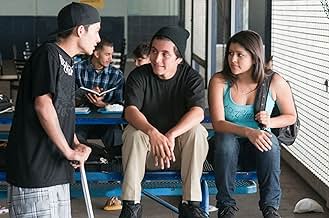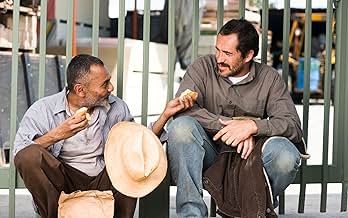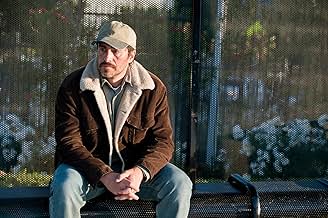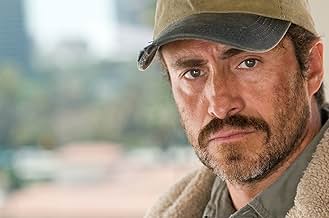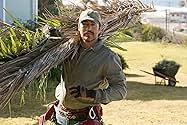A Better Life
- 2011
- Tous publics
- 1h 38min
NOTE IMDb
7,2/10
17 k
MA NOTE
Ajouter une intrigue dans votre langueA gardener in East L.A. struggles to keep his son away from gangs and immigration agents while trying to give his son the opportunities he never had.A gardener in East L.A. struggles to keep his son away from gangs and immigration agents while trying to give his son the opportunities he never had.A gardener in East L.A. struggles to keep his son away from gangs and immigration agents while trying to give his son the opportunities he never had.
- Nommé pour 1 Oscar
- 5 victoires et 10 nominations au total
Demián Bichir
- Carlos Galindo
- (as Demian Bichir)
Bella Balajadia
- Bella
- (as Isabella Balajadia)
Histoire
Le saviez-vous
- AnecdotesThe plot of the film is very similar to that of "Bicycle Thieves", which centers around a man and his son searching for a stolen bicycle vital to the man's job.
- GaffesAt 21:10, the size and shape of the bread that Santiago is giving to Carlos Galindo is different from different angles.
- Citations
Carlos Galindo: This country is a land of dreams. It can be a hard place, a cruel place. But it's where I work, and I dream of a better place for my son.
- Bandes originalesRolex
Written by Thaka Dillo and Cx Kidtronik (as Christopher Davis)
Performed by Cx Kidtronik (as CX Kidtronik) and Tchaka Diallo
Courtesy of Tchaka Diallo
Commentaire à la une
A BETTER LIFE is one of the more understated films to come out of Hollywood, a film that has the courage to tell a story that is so politically charged - the immigration debate - that releasing it now is on the one hand asking for negative responses and on the other hand offers to the public the real truths behind our quandary about immigration. This country consists of immigrants - all of us - no matter how far back we have to trace our ancestry: the only people who did not begin their family history as immigrants from every country in the world and the Native Americans, and look how we are treating them! If this film does nothing else than plead the case of human understanding it will have accomplished more than legions of films that touch this subject too lightly.
Carlos Galindo (Demián Bichir, in an extraordinarily fine performance) crossed the border into the US with his new wife, looking for a way to improve his life. Upon arriving his wife gave birth to their son Luis (José Julián) and then promptly left Carlos in search of a better life, leaving Carlos to raise Luis alone. Carlos is an honest, caring man who must live in the shadow of being illegal: he cannot have a driver's license or papers that allow him the benefits of other people. Carlos has a steady job as a gardener with Blasco (Joaquín Cosio) who owns a truck and the two men work hard as gardeners.
When the film opens Carlos is saving is money from working with Blasco, living in a tiny house in the smarmy side of Los Angeles, trying to provide better schooling for his 15 year old Luis. Luis is of the age when he is easily influenced by his peers: his best friend is Ramon (Gabriel Chavarria) who is waiting to be of age to join the gang and forget about school in lieu of making money and living high. Luis is tempted to follow him, but he still attends school despite frequent absences and disinterest in education. Carlos is faced with a dilemma: Blasco wants to leave the business of gardening and suggests Carlos buy his truck and tools and start his own business. While Carlos sees the future in owning his own business (he can provide hope for a better life for Luis) he doesn't have enough money saved to buy the truck. His sister, indebted to Carlos for his protection and help, brings him her savings and Carlos buys the truck. Luis is surprised and then proud of his father's courage, but the happiness is short lived as one of the day laborers Carlos befriended - Santiago (Carlos Linares) - steals the truck, sells it on the black market and sends the money to his family in Mexico. It is this moment that provides an important turn for the relationship between Carlos and Luis. Luis bonds with his father and together they manage to locate the truck and take it back, only to be caught by the police for driving without a windshield. Carlos is jailed, Luis is devastated, but as Carlos is deported Luis pleads with him to 'come back home'. The film's ending tests the credibility a bit but it is heartwarming nevertheless.
The story as written by Eric Eason and Roger L. Simon is genuinely real and never veers toward the maudlin. They have created characters who not only demonstrate the importance of father son understanding and relationships, but they have approached the entire gamut of immigrant challenges and the manner in which this country deals with current immigrants in an honest manner. Without waving banners for or against immigration problems director Chris Weitz offers us the opportunity to see life from a different angle. One of the reasons this movie is so powerful in its impact and message is due to the brilliant performance by Demián Bichir, hopefully a candidate for an Oscar, and his performance is beautifully balanced by that of José Julián as his son. The film is scored by Alexandre Desplat and the music greatly enhances the rhythms of the story. There is such worth in this film that it would be wise for everyone in this country to view it - and remember our individual heritages and histories. Grady Harp
Carlos Galindo (Demián Bichir, in an extraordinarily fine performance) crossed the border into the US with his new wife, looking for a way to improve his life. Upon arriving his wife gave birth to their son Luis (José Julián) and then promptly left Carlos in search of a better life, leaving Carlos to raise Luis alone. Carlos is an honest, caring man who must live in the shadow of being illegal: he cannot have a driver's license or papers that allow him the benefits of other people. Carlos has a steady job as a gardener with Blasco (Joaquín Cosio) who owns a truck and the two men work hard as gardeners.
When the film opens Carlos is saving is money from working with Blasco, living in a tiny house in the smarmy side of Los Angeles, trying to provide better schooling for his 15 year old Luis. Luis is of the age when he is easily influenced by his peers: his best friend is Ramon (Gabriel Chavarria) who is waiting to be of age to join the gang and forget about school in lieu of making money and living high. Luis is tempted to follow him, but he still attends school despite frequent absences and disinterest in education. Carlos is faced with a dilemma: Blasco wants to leave the business of gardening and suggests Carlos buy his truck and tools and start his own business. While Carlos sees the future in owning his own business (he can provide hope for a better life for Luis) he doesn't have enough money saved to buy the truck. His sister, indebted to Carlos for his protection and help, brings him her savings and Carlos buys the truck. Luis is surprised and then proud of his father's courage, but the happiness is short lived as one of the day laborers Carlos befriended - Santiago (Carlos Linares) - steals the truck, sells it on the black market and sends the money to his family in Mexico. It is this moment that provides an important turn for the relationship between Carlos and Luis. Luis bonds with his father and together they manage to locate the truck and take it back, only to be caught by the police for driving without a windshield. Carlos is jailed, Luis is devastated, but as Carlos is deported Luis pleads with him to 'come back home'. The film's ending tests the credibility a bit but it is heartwarming nevertheless.
The story as written by Eric Eason and Roger L. Simon is genuinely real and never veers toward the maudlin. They have created characters who not only demonstrate the importance of father son understanding and relationships, but they have approached the entire gamut of immigrant challenges and the manner in which this country deals with current immigrants in an honest manner. Without waving banners for or against immigration problems director Chris Weitz offers us the opportunity to see life from a different angle. One of the reasons this movie is so powerful in its impact and message is due to the brilliant performance by Demián Bichir, hopefully a candidate for an Oscar, and his performance is beautifully balanced by that of José Julián as his son. The film is scored by Alexandre Desplat and the music greatly enhances the rhythms of the story. There is such worth in this film that it would be wise for everyone in this country to view it - and remember our individual heritages and histories. Grady Harp
Meilleurs choix
Connectez-vous pour évaluer et suivre la liste de favoris afin de recevoir des recommandations personnalisées
Détails
- Date de sortie
- Pays d’origine
- Site officiel
- Langues
- Aussi connu sous le nom de
- The Gardener
- Lieux de tournage
- Sociétés de production
- Voir plus de crédits d'entreprise sur IMDbPro
Box-office
- Budget
- 10 000 000 $US (estimé)
- Montant brut aux États-Unis et au Canada
- 1 759 252 $US
- Week-end de sortie aux États-Unis et au Canada
- 62 087 $US
- 26 juin 2011
- Montant brut mondial
- 1 863 506 $US
- Durée1 heure 38 minutes
- Couleur
- Mixage
- Rapport de forme
- 1.85 : 1
Contribuer à cette page
Suggérer une modification ou ajouter du contenu manquant







